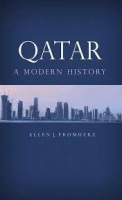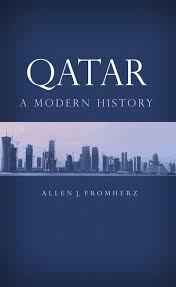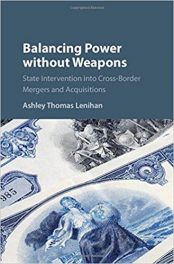 Author: Allen J. Fromherz
Author: Allen J. Fromherz
Publisher: Georgetown University Press – 204 pages
Book Review by: Sonu Chandiram
Qatar is a small country of 4,467 square miles, about 20 percent smaller than the U.S. state of Connecticut which is 5,543 square miles in size. It is located on the east coast of its very large neighbor Saudi Arabia, south of the island of Bahrain, and north of United Arab Emirates. Far to its east in the Persian Gulf is Oman.
Its current population is estimated to be less than two million people. What is very different about Qatar from other countries is that only about a quarter million or around one-eighth of its population are Qataris. The vast majority are foreigners, who have gone there because of its immense economic opportunities. About a quarter of its inhabitants have come from India, 13 percent from nearby Arab nations and 12 percent from faraway Philippines.
Qatar is one of the richest countries in the world when calculated by the potential share of its wealth by each inhabitant. Qatar has probably the world’s highest gross domestic product (GDP) per capita on a PPP (purchasing power parity) basis. It was U.S. $102,943 in April 2012, according to International Monetary Fund numbers. In Qatari currency, this is equal to nearly 375,000 riyals (374,815 to be exact) a year or 31,500 riyals a month per person.
Taking into account that the average monthly rent of a one-bedroom apartment in its capital Doha is about 6,500 riyals, assume monthly food cost at 5,000 riyals, and all other costs at another 3,500 for a total of 15,000, the average person can still save about 15,000 or half his or her monthly income of over 30,000 riyals.
Qatar is an emirate and has been ruled by the Al Thani family since the mid-nineteenth century. It was a British protectorate until it got its independence in 1971. It has enormous reserves of oil and natural gas. The country is also a big buyer of foreign goods. In 2009, Qatar was the United States’ fifth-largest export market in the Middle East, after the United Arab Emirates (UAE), Israel, Saudi Arabia and Egypt.
This country has the lowest literacy rate in the Middle East with only 3.1 percent of males and 4.2 percent of females not being able to read and write. Citizens are required to attend government-provided education from kindergarten through high school.
Qatar spends only 1.4 percent of its GDP on health care (compared to more than 16 percent of one-sixth of GDP in the United States). Hamad Medical Corporation, affiliated with Cornell University, is the premier non-profit health care provider in Doha.
The author of this book Allen Fromherz, who has taught at Qatar University, describes this country as an unusual amalgam of cultural, demographic, economic, political and religious elements where “monarchy, traditional tribal culture, and conservative Islamic values appear to coexist with ultramodern development and a large population of foreigners who outnumber Qatari citizens.”
There are many questions he asks and provides answers to, among the topics he discusses in nine chapters, and comes to interesting conclusions worth reading closely
- Qatar – A New Model or Modernity?
- Qatar – Geography of a Near Frontier
- The Origins of Qatar – between ‘Emergence’ and ‘Creation’
- Creating Social Realities – Qatar and the British in the Twentieth Century
- Sheikh Khalifa and the Enigma of Independence
- Sheikh Hamad and the Future of Qatar
- Qatar’s Political Economy – A Class Rentier State?
- The Emir and the Exercise of Authority in Qatar
- Conclusion – Change or Continuity?
He traces these topics of study through history and paints a picture of modern Qatar as one of the most respected and influential nations in the Middle East. He points out that while the people in Qatar live in a monarchy, it is a very stable, long lasting, and benevolent one.
The present Emir, Hamad bin Khalifa, who has been in power since 1995, shares his authority with many members of the Al-Thani family through formal positions they hold. They have opportunities for dissent and discussion with him and others in the ruling family.
It seems like one big happy family ruling a country blessed with natural resources, and contented people who have large incomes and benefits such as education by the government and low-cost health care. Such stability has enabled rapid economic development and Qatar’s fast entry into the modern age with good living standards.
Allen J. Fromherz is Assistant Professor of History at Georgia State University. He was previously Assistant Professor of Middle Eastern History at Qatar University. He received his PhD from the University of St. Andrews in Scotland after graduating from Dartmouth College in New Hampshire and was awarded a Fulbright Research Scholarship to Morocco.
In 2010 he was awarded the Gerda Hinkel Stiftung fellowship to pursue research on the history of nationalism in the Middle East. He is also the author of The Rise of an Islamic Empire (I.B. Tauris) and Ibn Khaldun, Life and Times.







